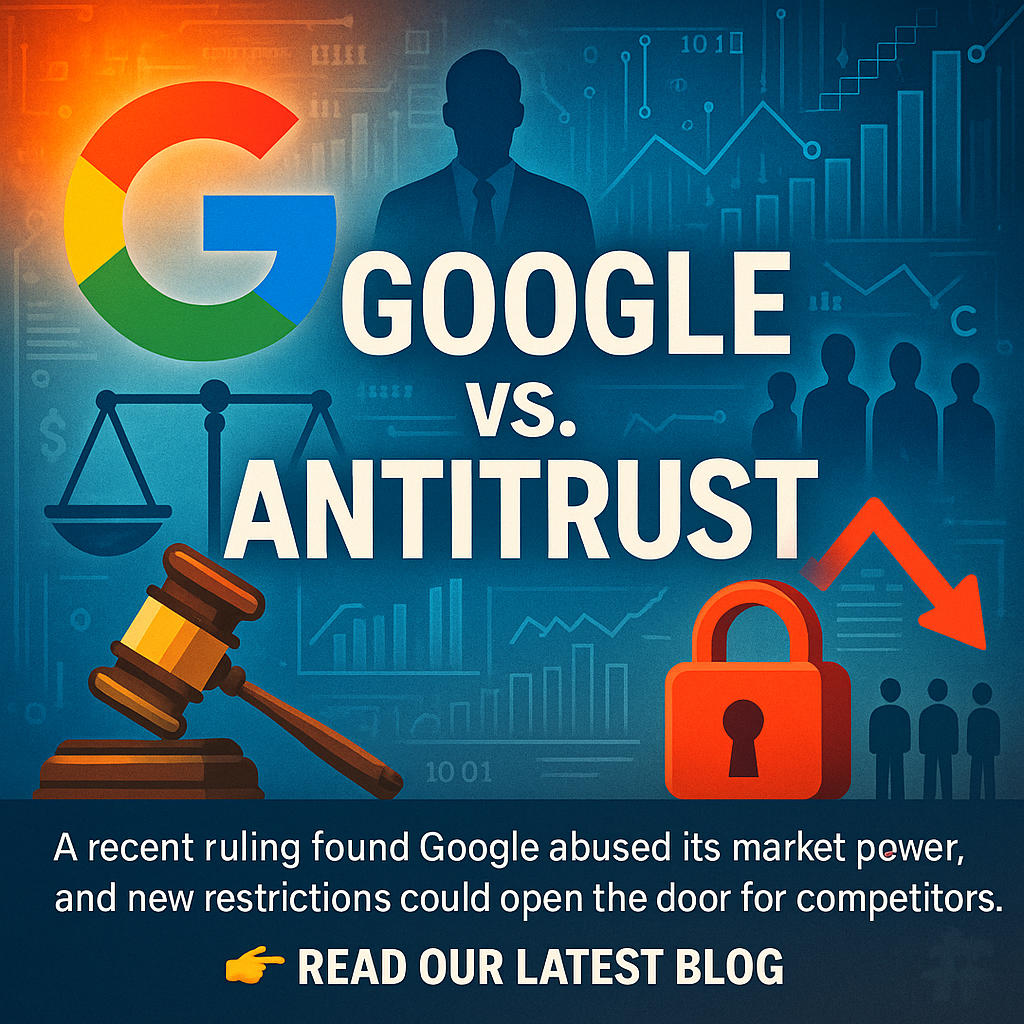Google is under multiple legal and regulatory attacks right now. Critics say its dominance in online search, advertising technology (“ad tech”), preloaded apps, and artificial intelligence gives it unfair advantages that stifle competition. Google counters that many of the proposed remedies are extreme or would hamper innovation. Below, I break down what’s happened so far, what’s at stake, and what might happen next.
Timeline & Key Rulings
- Search Monopoly Case
- Filed in 2020, this lawsuit (United States v. Google LLC) centers on Google’s dominance in internet search, agreements with device manufacturers and browsers (e.g. Apple, Samsung) to make Google the default search engine, and bundling of services.
- In August 2024, Judge Amit P. Mehta ruled that Google maintains a monopoly in those markets and violated U.S. antitrust law.
- Ad Tech / Digital Advertising Case
- Filed in January 2023 by the DOJ and several states, this case accuses Google of illegally monopolizing the tools that publishers and advertisers use: ad servers, ad exchanges, and the broader “ad tech stack.”
- In April 2025, Judge Leonie Brinkema ruled that Google did violate antitrust law in two key markets: the publisher ad server market and the open-web display ad exchange market.
- Remedies Phase & Recent Decisions
- After finding liability, the courts have moved into what remedies should look like. The DOJ has proposed fairly sweeping changes: ending certain exclusive default search agreements, forcing Google to share data (search index, usage data) with competitors, and in some proposals, divesting Chrome or Android if competition doesn’t sufficiently return.
- Judge Mehta’s more recent ruling (September 2025) stops short of forcing Google to divest Chrome or Android. However, it bars Google from entering or maintaining exclusive contracts that tie the distribution of its search engine, browser (Chrome), Assistant, or Gemini (their AI) to other apps or revenue-sharing conditions. It also requires Google to share certain data with “qualified competitors.”
What Google Is Arguing
- Google maintains that many of the remedies proposed by the DOJ are too draconian. They argue forced divestitures, data sharing requirements, or banning default search deals will disrupt the ecosystem, might harm consumers, or reduce the incentive for innovation.
- With the rise of generative AI (e.g. tools like ChatGPT, models like Google’s own Gemini), Google says the competitive landscape has shifted. The presence of new entrants and the way people find information is evolving. The company and the courts are using this point to argue about what is a realistic remedy.
Stakes: What’s at Risk
For Google:
- If the remedies are enforced, Google could lose some of its control over default search placements, possibly lose or have to change licensing for its browser or bundled apps, and be forced to open parts of its infrastructure or data to competitors. All of which could reduce margins or growth levers.
For Competitors / New Entrants:
- More opportunity. If Google is barred from exclusive default deals, smaller search engines or AI search tools might gain distribution. Access to search index and behavior data could level the playing field. New or niche ad tech players may find more room.
For Advertisers / Publishers / Consumers:
- Publishers may benefit if the ad tech market is less concentrated—better rates, more choice. Consumers could see more competition in search interfaces and possibly different search products or experiences. But there are risks: too much regulatory burden or poorly designed data-sharing could lead to privacy issues, slower innovation, or worse user experience.
Challenges & Considerations
- Designing remedies is hard. Dividing up parts of Google (Chrome, Android, etc.) or forcing data access raises technical, legal, and privacy challenges. What data exactly gets shared, under what protections?
- The speed of tech change – especially AI – is rapid. What looks like a competitive threat today might vanish, or vice versa. Remedies need to be flexible and enforceable over time.
- The precedent this sets is enormous. If Google is forced to change core business models, other Big Tech firms will be watching (Amazon, Meta, etc.). Regulators likely will use these cases to pressure behavior in multiple domains.
What Happens Next
- The courts will finalize the judgment on remedies. As of September 2025, Judge Mehta’s opinion requires a revised final judgment incorporating these behavior remedies.
- Google will likely appeal parts of the rulings, especially the more burdensome ones—divesting, data sharing, limiting exclusive deals.
- Watch for regulatory moves in the EU and the UK as well. Google is already facing fines and investigations there related to ad tech self-preferencing or the misuse of their dominant position.
My Take: What This Means in the Big Picture
If you asked me—having been around marketing & digital for decades—this is one of the more consequential antitrust moments in tech in a long time. Here’s why:
- Because “advertising revenue” is Google’s cash cow, its influence over publishers, advertisers, and the open web is baked in. Breaking up or restricting its control over ad tech will ripple across media, marketing budgets, publisher relationships, and all of digital content.
- The treatment of “default search agreements” (e.g., making Google the search option by default on phones or browsers) is going to reshape how we think about competition—not because defaults were evil per se, but because when they’re locked in over years, they make rival products almost irrelevant regardless of quality.
- AI is accelerating change, but regulatory frameworks are still catching up. Courts are now considering whether antitrust law should evolve to address the feedback loops, data access, and entrenched advantage accelerated by AI.
- There’s a balancing act: too much regulatory interference could stifle innovation or make services worse; too little, and Google continues to reinforce dominance in a way that blocks new entrants.
What to Keep an Eye On
• Final remedy decisions: exactly what Google is forced to stop doing, what it must share, and whether divestiture happens.
• How quickly Google must comply and how enforceable oversight or monitoring will be.
• The role of AI rivals: if tools like Gemini, OpenAI, Perplexity etc. keep growing, they might change what “competition” looks like in search and information discovery.
• Reactions from industry—advertisers, publishers, browser makers, device OEMs. Will there be pushback, litigation, or partnerships aimed at working around remedies?



